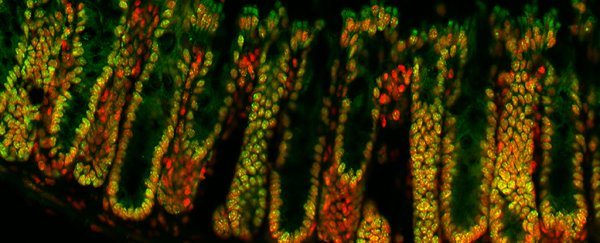Your gut microflora isn't just sitting silently waiting for you to wolf down your next meal – it turns out there's a constant conversation going on between these bacteria and your body's genetic code.
New research has found a chemical produced by 'good' bacteria in our digestive system has an unusual effect on the chromosomes in nearby cells, a discovery that could help us better understand links between our diet and the development of one of the world's most deadly cancers.
A team led by scientists from the Babraham Institute in the UK discovered that DNA in the epithelial tissues of the human colon contain an unusual level of a chemical known to act as an epigenetic switch, turning genes on and off.
What's more, they found these levels were elevated in just one other part of the body: our brain.
Crotonylation is a recently discovered genetic editing process not unlike the more familiar form of genetic manipulation called methylation.
Both processes change how genes are expressed by tweaking the surrounding chemistry, without altering the actual code itself.
While methylation involves the addition of a methyl group (CH3) to a nucleotide base – usually cytosine (C), but occasionally adenosine (A) – crotonylation clips an acetyl group onto proteins called histones that help keep strands of DNA neatly ordered.
Finding crotonylated histones in gut tissue suggests something is preventing the body from removing those acetyl groups. And the researchers suspected they knew what it could be.
Small organic molecules called short-chain fatty acids (SCFA) are produced when the fibre in our fruit in veg is fermented by our resident microbes.
Previous research had suggested there were links between the cell's metabolism and crotonylation, pointing to SCFAs as the culprit.
The researchers analysed tissue from the colon, brain, liver, spleen, and kidney, and found higher levels of histone crotonylation in the brain and colon.
Why this occurs in the brain but not the other organs is still something of a mystery.
Yet this new study demonstrates it's the bacteria that are ultimately responsible for the modification.
"Short chain fatty acids are a key energy source for cells in the gut but we've also shown they affect crotonylation of the genome," says lead author Rachel Fellows from Babraham Institute.
Specifically, SCFAs produced by the kinds of bacteria found in a healthy human colon promote crotonylation by preventing an enzyme called histone deacetylase 2 (HDAC2) from removing the markers.
To confirm bacteria were indeed responsible, the researchers dosed mice with a cocktail of antibiotics to wipe out most of the bacterial microflora in their guts. Not only did the SCFAs drop, so too did the crotonylation of the histones in their gut lining.
Exactly what benefits the bacteria might get – if any – wasn't addressed by the study.
But the research could have implications in how our genes are affected by our diet, which could go some way to help flesh out the links between dietary fibre and bowel cancer.
With around 770,000 deaths from colorectal cancer each year, finding more ways to prevent and treat the disease is a high priority for researchers.
Meanwhile, it's a good reminder for us to check our diet and make sure it's not just our bodies that are being well fed, but our tiniest citizens as well.
"Our intestine is the home of countless bacteria that help in the digestion of foods such as plant fibres," says the study's lead scientist, Patrick Varga-Weisz.
"They also act as a barrier to harmful bacteria and educate our immune system. How these bugs affect our cells is a key part of these processes."
This research was published in Nature Communications.
